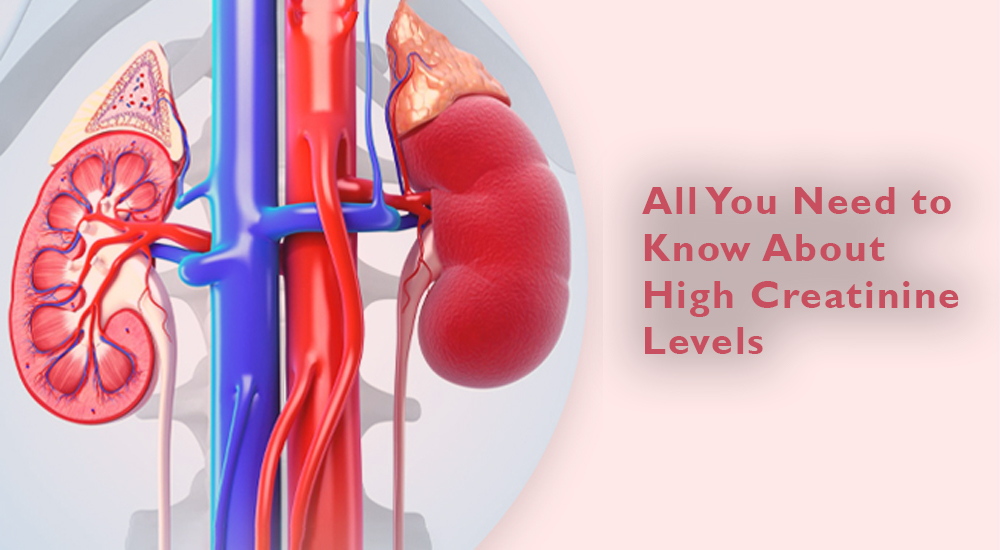
High creatinine levels in the blood or urine for a prolonged period may indicate various health conditions, including kidney and kidney failure. Creatinine levels higher than 1.2 milligrams per decilitre for males and 1.0 milligrams per decilitre are considered high creatinine levels.
Creatinine is a waste product of the muscles. Our kidneys help filter out creatinine from the blood and emit it through urine. High levels of creatinine may indicate the kidneys are not functioning properly. This article explores the symptoms, causes and treatment options for high creatinine levels.
What is creatinine?
Creatinine is the waste product made by your muscles. It is a metabolite of creatinine phosphate which muscles use as energy. The greater an individual’s muscle mass, the higher their creatinine levels. This is the main reason why males tend to have high creatinine levels. Your kidneys filter out creatinine from blood and discharge it through urine.
What causes high creatinine levels?
Generally, high creatinine levels indicate that the kidneys are not working as they should. The possible causes of high creatinine levels may include:
Apart from the kidney complications, several factors can also affect the creatinine levels. Pregnancy, dehydration, nutritional supplements and too much protein may increase creatinine levels. High-intensity exercise may also temporarily increase creatinine levels. Certain medicines may temporarily increase creatinine levels. Some health conditions, including diabetes, heart disease, and high blood pressure can also temporarily increase creatinine levels.
Symptoms of high creatinine levels:
Generally, the symptoms depend on the condition that causing high creatinine levels.
Kidney infection
Untreated kidney infections can damage the kidneys and can even lead to kidney failure. The symptoms may include:
Drug toxicity
Certain medicines including antibiotics, cardiovascular drugs, lithium, and diuretics can affect the kidneys functioning ability and may damage the kidneys. The symptoms may include:
Glomerulonephritis
This condition refers to inflammation of the kidney parts that filter out creatinine from the blood. Lupus, Goodpasture syndrome and other infections are the potential causes of glomerulonephritis. This condition may lead to kidney scarring, kidney damage and even failure. Common symptoms may include:
Urinary tract blockage
Your urinary tract may get blocked for several reasons, including kidney stones, tumours or an enlarged prostate gland. In this situation, the urine may accumulate in the kidneys, leading to hydronephrosis. The symptoms can include:
Diabetes
In people with diabetes, their blood sugar levels may become too high which can lead to various health issues, including kidney problems. There are mainly two types of diabetes: type 1 diabetes and type 2 diabetes. The symptoms of type 1 diabetes may appear suddenly, while the symptoms of type 2 diabetes develop gradually. Both types of diabetes may cause:
Heart disease
Conditions affecting the heart and blood vessels, such as atherosclerosis and congestive heart failure can also impact the kidneys. These conditions affect the blood flow through the kidneys, impacting kidney functions.
The symptoms of heart disease depend on the type of disease. For example, atherosclerosis does not cause symptoms until an artery is extremely narrowed or completely blocked. However, common symptoms of atherosclerosis include:
The symptoms of congestive heart disease may include:
Kidney failure
Kidney failure indicates that the kidney has stopped functioning, which is the most common cause of high creatinine levels. Kidney failure can be either acute or chronic. The symptoms of acute kidney failure appear quickly, while chronic kidney failure symptoms develop gradually. Common symptoms of kidney failure include:
Treatment:
The treatment of high creatinine levels depends on the underlying cause. A kidney infection can cause high creatinine levels which can be treated with antibiotics. On the other hand, if creatinine levels are caused by high blood pressure, medications can help lower the levels. Based on the cause, your doctor may suggest certain lifestyle changes, such as reducing protein consumption and increasing fibre intake.
Multiple factors, such as underlying health conditions, medications and diet can cause high creatinine levels. However, the levels should return to normal after treating the underlying cause. If you are experiencing symptoms related to high creatinine levels, consult your doctor immediately. The right treatment can reduce potential kidney damage and increase the likelihood of recovery.